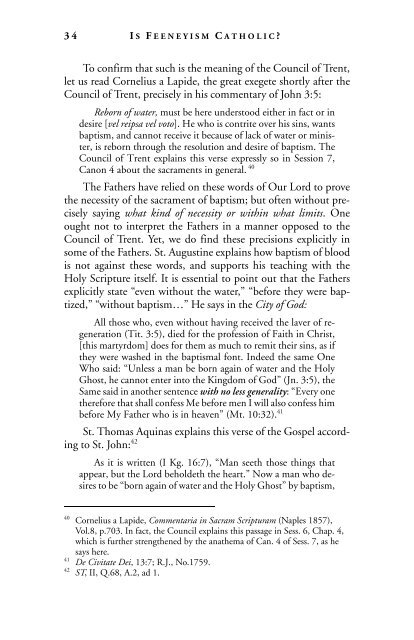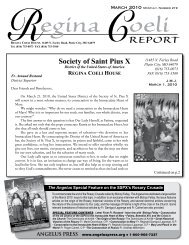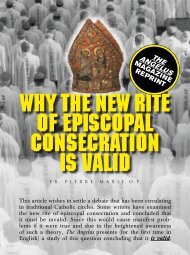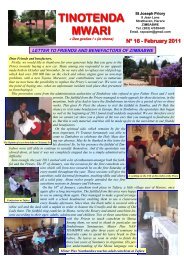Is Feeneyism Catholic? - Society of St. Pius X
Is Feeneyism Catholic? - Society of St. Pius X
Is Feeneyism Catholic? - Society of St. Pius X
You also want an ePaper? Increase the reach of your titles
YUMPU automatically turns print PDFs into web optimized ePapers that Google loves.
34 IS F EENEYISM C ATHOLIC?<br />
To confirm that such is the meaning <strong>of</strong> the Council <strong>of</strong> Trent,<br />
let us read Cornelius a Lapide, the great exegete shortly after the<br />
Council <strong>of</strong> Trent, precisely in his commentary <strong>of</strong> John 3:5:<br />
Reborn <strong>of</strong> water, must be here understood either in fact or in<br />
desire [vel reipsa vel voto]. He who is contrite over his sins, wants<br />
baptism, and cannot receive it because <strong>of</strong> lack <strong>of</strong> water or minister,<br />
is reborn through the resolution and desire <strong>of</strong> baptism. The<br />
Council <strong>of</strong> Trent explains this verse expressly so in Session 7,<br />
Canon 4 about the sacraments in general. 40<br />
The Fathers have relied on these words <strong>of</strong> Our Lord to prove<br />
the necessity <strong>of</strong> the sacrament <strong>of</strong> baptism; but <strong>of</strong>ten without precisely<br />
saying what kind <strong>of</strong> necessity or within what limits. One<br />
ought not to interpret the Fathers in a manner opposed to the<br />
Council <strong>of</strong> Trent. Yet, we do find these precisions explicitly in<br />
some <strong>of</strong> the Fathers. <strong>St</strong>. Augustine explains how baptism <strong>of</strong> blood<br />
is not against these words, and supports his teaching with the<br />
Holy Scripture itself. It is essential to point out that the Fathers<br />
explicitly state “even without the water,” “before they were baptized,”<br />
“without baptism…” He says in the City <strong>of</strong> God:<br />
All those who, even without having received the laver <strong>of</strong> regeneration<br />
(Tit. 3:5), died for the pr<strong>of</strong>ession <strong>of</strong> Faith in Christ,<br />
[this martyrdom] does for them as much to remit their sins, as if<br />
they were washed in the baptismal font. Indeed the same One<br />
Who said: “Unless a man be born again <strong>of</strong> water and the Holy<br />
Ghost, he cannot enter into the Kingdom <strong>of</strong> God” (Jn. 3:5), the<br />
Same said in another sentence with no less generality: “Every one<br />
therefore that shall confess Me before men I will also confess him<br />
before My Father who is in heaven” (Mt. 10:32). 41<br />
<strong>St</strong>. Thomas Aquinas explains this verse <strong>of</strong> the Gospel according<br />
to <strong>St</strong>. John: 42<br />
As it is written (I Kg. 16:7), “Man seeth those things that<br />
appear, but the Lord beholdeth the heart.” Now a man who desires<br />
to be “born again <strong>of</strong> water and the Holy Ghost” by baptism,<br />
40 Cornelius a Lapide, Commentaria in Sacram Scripturam (Naples 1857),<br />
Vol.8, p.703. In fact, the Council explains this passage in Sess. 6, Chap. 4,<br />
which is further strengthened by the anathema <strong>of</strong> Can. 4 <strong>of</strong> Sess. 7, as he<br />
says here.<br />
41 De Civitate Dei, 13:7; R.J., No.1759.<br />
42 ST, II, Q.68, A.2, ad 1.











